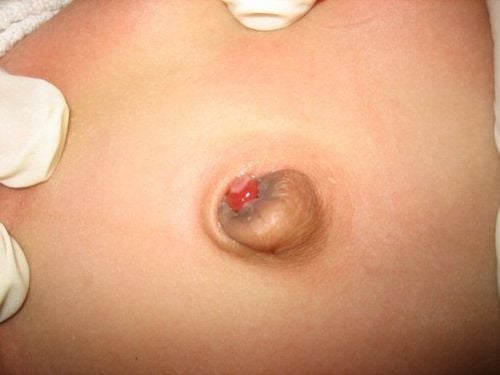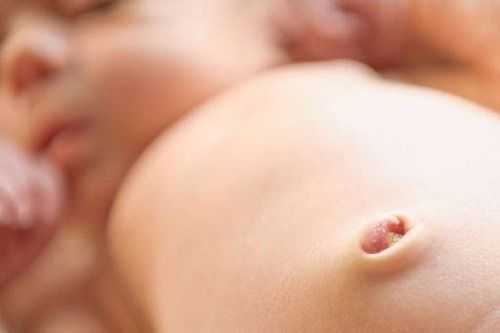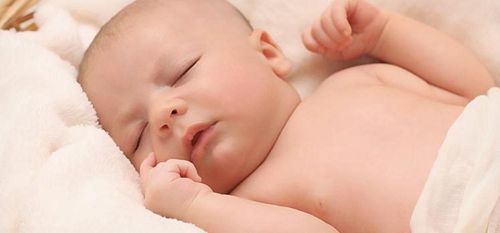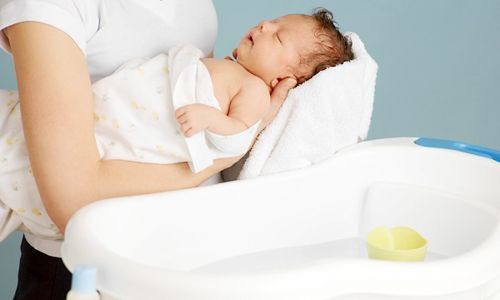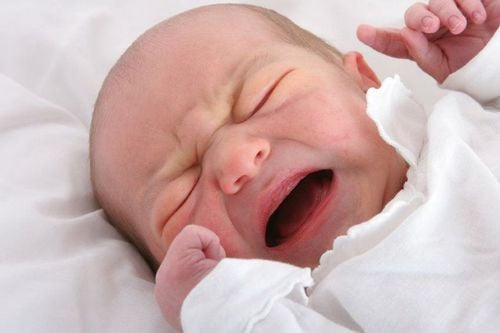This is an automatically translated article.
The article is professionally consulted by Master, Doctor Nguyen Thi An - Pediatrician - Neonatologist - Department of Pediatrics - Neonatology - Vinmec Ha Long International General Hospital. The doctor is a person who is very passionate about health care for children and has experience in successfully treating many difficult cases in infants.Normally, the umbilical cord of a newborn will fall off in a period of 7 to 20 days, this is a normal phenomenon, but in cases where the baby umbilical cord is foul with white pus or the baby umbilical cord has yellow pus. Mothers need to be very careful because this is a sign that the baby's navel is infected.
1. How dangerous is the umbilical cord of a newborn baby with white pus?
The umbilical cord of the newborn plays an extremely important role in receiving the mother's nutrients right from the womb. After the baby is born, the newborn umbilical cord takes some time to heal and fall off.Newborn umbilical cord loss is a normal phenomenon, but in cases where the infant umbilical cord is foul with white pus or the infant umbilical cord has yellow pus, the mother needs to be very cautious because this is a sign of found that the navel was infected.
When the baby's navel is infected, in addition to the signs of fouling with white or yellow pus, the mother will see the navel and the surrounding abdominal skin with symptoms such as: swelling, redness or bleeding in the navel.
Because the umbilicus is connected with blood vessels, any damage to this area will have negative effects on the blood and internal organs of the newborn. The most dangerous complication that an umbilical infection can cause is umbilical tetanus, a blood infection - one of the leading causes of infant death.
2. Causes of pus in the baby's navel
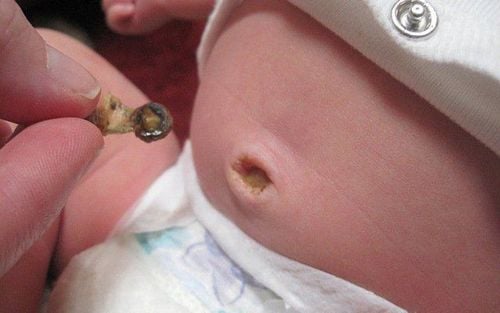
Rốn trẻ sơ sinh có mủ trắng hay vàng là tình trạng cuống rốn của bé bị viêm nhiễm do vi trùng sinh mủ gây nên
Parents have not properly cleaned the baby's umbilical cord such as the umbilical cord is too tight, the umbilical cord is not cleaned regularly, forgot to clean hands before cleaning the umbilical cord. , using folk remedies to sprinkle on the navel without a doctor's prescription... There are also some cases where the mother is afraid of the baby's pain but dare not touch the baby's navel, so she doesn't change the bandages as well as the baby's belly button. cleaning the baby's umbilical cord for a long time leads to the case that the baby's umbilical cord is foul and accompanied by pus. There are many mothers who are too hygienic, bathing and cleaning the umbilical cord for their children regularly without understanding that the wrong method of taking care of the baby's umbilical cord is the cause of the long-term fall of the umbilical cord and the infection of the umbilicus for the child. These things are the cause of the baby's umbilical cord being wet, not draining moisture and a favorable environment for inflammatory bacteria to grow.
3. What to do when the umbilical cord of the newborn is foul with white pus?
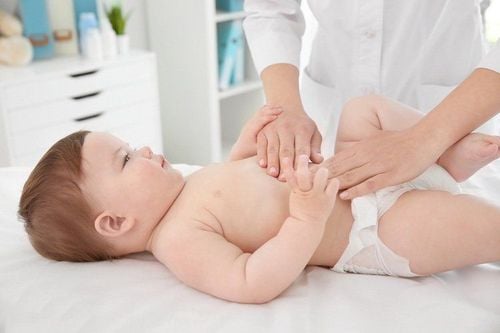
Khi nhận thấy rốn của trẻ sơ sinh có mủ sau khi rụng hoặc chưa rụng có kèm mùi hôi thì bậc phụ huynh nên đưa bé đến bệnh viện để khám ngay
Besides, taking good care of the umbilical cord will directly determine the health of the baby, so mothers need to be more careful in cleaning the umbilical cord. The following are some notes in the care of the umbilical cord in newborns that mothers do correctly:
The baby's umbilical cord needs to be kept clean and dry at all times. You should fold your baby's diaper down below the umbilical cord so that the umbilical cord can be exposed to air and dry. Do not get urine or feces on the baby's umbilical cord, and at the same time clean the bottom of the baby's umbilical cord with a cotton pad or gauze soaked in alcohol 1-2 times a day. In case of faeces or urine on the navel, it is necessary to clean the baby's navel and change the diaper immediately. In high temperature conditions, mothers only need to dress their babies in diapers and loose T-shirts to allow air to circulate and speed up the drying process of the navel. Do not wear tight bras for your baby until the umbilical cord has fallen off and is completely dry. Mothers should not be impatient when the baby's umbilical cord does not fall off at the expected time, because the time of umbilical cord shedding is different for each baby, so you absolutely should not try to cut the umbilical cord, even if the baby's umbilical cord is not shed. was loose and the cohesion was only a little. Before bathing or personal hygiene for the baby, remember to wash your hands with soap to prevent bacteria from entering the baby's body. If the mother is not hygienic, the cut part of the umbilical cord is very susceptible to infection that can cause tetanus or blood infection - one of the serious complications leading to death in newborns. After bathing and personal hygiene for the baby, your mother should change the baby's umbilical cord immediately. Need to disinfect hands with alcohol 70 degrees before removing the old umbilical cord gauze to clean the baby's navel. Use a cotton swab soaked in Povidine solution to clean from the tip of the navel to the base of the navel, then the mother should apply a new gauze bandage and fix it with gauze.
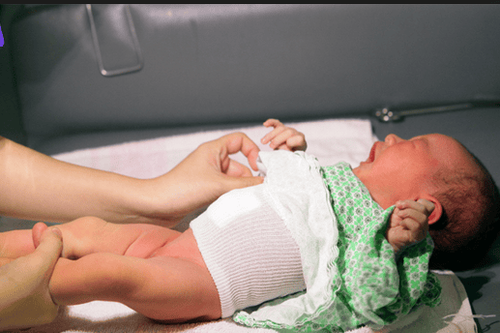
Sau khi tắm, vệ sinh cá nhân cho trẻ, các mẹ bạn nên thay băng rốn cho bé ngay
Please dial HOTLINE for more information or register for an appointment HERE. Download MyVinmec app to make appointments faster and to manage your bookings easily.




